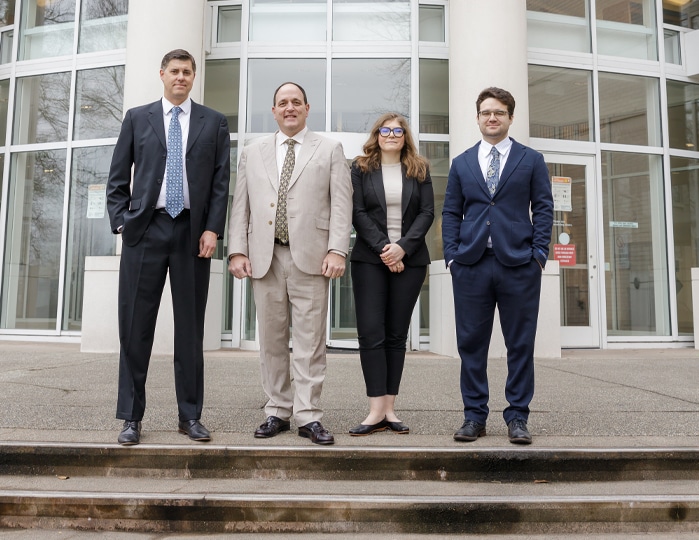Free Case Evaluation

Seattle Placental Abruption Lawyers
Compassionate advocacy for mothers and newborns who suffer injuries during pregnancy
Placental abruptions can occur from the 20th week of pregnancy through the third trimester. If doctors fail to anticipate, monitor, and treat placental abruptions, the mother and/or child can suffer severe injuries, including death. At Smith McBroom, we hold healthcare providers accountable for birth injuries and fatalities. Our Seattle placental abruption lawyers demand compensation for the mother’s and baby’s financial damages, loss of quality of life, and pain and suffering. Call us today to hold negligent physicians and hospitals liable.

How can we help?
- What is placental abruption?
- What are the risk factors for placental abruption?
- What are the signs of placental abruption?
- How is placental abruption diagnosed in Seattle?
- What are the treatments for placental abruption?
- What complications can occur when placental abruption occurs?
- How do you hold healthcare providers accountable for placental abruption?
- Do you have a Seattle placental abruption lawyer near me?
Free Case Evaluation
What is placental abruption?
Placental abruption is a medical complication that pregnancy doctors (gynecologists) and birth delivery doctors (obstetricians) should look for. According to the Mayo Clinic, the placenta “develops in the uterus during pregnancy.” The placenta attaches to the uterine wall. The placenta supplies the oxygen and nutrients that the baby needs.
A placental abruption happens when the placenta completely or partially “separates from the inner wall of the uterus before delivery.” The abruption can cause the mother to bleed heavily and prevent the baby from getting the oxygen and nutrients the baby needs.
Placental abruption is a life-threatening emergency (for the mother and the baby) that requires immediate medical care.
What are the risk factors for placental abruption?
Some of the risk factors for a placental abruption include:
- A placental abruption in a prior pregnancy
- Hypertension (chronic high blood pressure)
- Preeclampsia, eclampsia, HELLP syndrome, and other hypertension disorders that occur during pregnancy
- Any harm to the abdomen, such as when a mother falls
- Smoking or using drugs, such as cocaine
- Uterine infections during pregnancy
- Being 40 or older
- “Early rupture of membranes, which causes leaking amniotic fluid before the end of pregnancy”
What are the signs of placental abruption?
The Mayo Clinic identifies the following signs of potential placental abruption:
- Vaginal bleeding
- Pain in the abdomen
- Back pain
- Tenderness or rigidity of the uterus
- Uterine contractions – “one right after another”
- Abdominal and back pain often begins suddenly
Note: the amount of vaginal bleeding may vary. Vaginal bleeding “doesn't necessarily indicate how much of the placenta has separated from the uterus. It's possible for the blood to become trapped inside the uterus, so even with a severe placental abruption, there might be no visible bleeding.”
How is placental abruption diagnosed in Seattle?
The Mayo Clinic states that your doctors should conduct a physical examination of the uterus if they suspect a placental abruption. Blood tests, urine tests, and ultrasound imaging tests help in the diagnosis of a placental abruption. An ultrasound test uses high-frequency sound waves to create an image of the mother’s uterus.
What are the treatments for placental abruption?
Once a placenta separates from the uterine wall, it can’t be reattached. The treatment options vary based on the pregnancy:
- The baby isn't near full term. For mild cases, if the baby has a normal heart rate, and if it’s too soon for the baby’s birth – the mother may be hospitalized. The mother may be released to home care if the bleeding stops and the health of the baby is stable. If an early delivery is required, the mother may be given medications to help the baby’s lungs mature and protect the brain of the baby.
- The baby is near full term. A closely monitored vaginal delivery may be possible after 34 weeks of pregnancy and if the placental abruption seems minimal. Otherwise, immediate delivery will be performed – usually by a Cesarean section (C-section).
A blood transfusion may be necessary if there is severe bleeding.
What complications can occur when placental abruption occurs?
The consequences of placental abruption can include:
- For the mother:
- Shock because of losing blood
- Blood clots
- The need to provide a blood transfusion
- Kidney failure and other organ failure due to the loss of blood
- A possible hysterectomy if the bleeding of the uterus can’t be controlled
- For the baby:
- Restricted or delayed growth caused by the lack of nutrients
- Oxygen deprivation which can cause cerebral palsy, HIE, and other birth injuries
- Premature birth
Both the mother and baby may die if placental abruption isn’t treated properly. At Smith McBroom, we hold healthcare providers in Seattle who commit medical malpractice due to placental abruption accountable.
How do you hold healthcare providers accountable for placental abruption?
Our Seattle birth injury lawyers work with our own network of doctors to understand what happened during the pregnancy and birth of a child. These medical professionals are skilled at showing what pre-delivery and delivery steps were taken to prevent, identify, and treat placental abruption.
Gynecologists, obstetricians, hospitals, and other healthcare providers may be liable for placental abruption injuries to both a mother and child if they commit the following mistakes:
- Fail to recognize the risk factors for placental abruption
- Fail to conduct the proper diagnostic tests
- Fail to admit the mother to the hospital for supervised care before the delivery of the child
- Fail to closely monitor a vaginal birth
- Fail to use a C-section when necessary
- Fail to control any vaginal bleeding
- Fail to perform other necessary healthcare procedures
Our Seattle placental abruption lawyers file medical malpractice claims against all responsible healthcare providers. We demand compensation for the current and future damages to the mother and the child including:
- All medical expenses including hospitalizations, surgeries, rehabilitative care, medications, and assistive devices
- Physical pain and emotional suffering
- Delayed growth or restricted growth
- Loss of the quality of life
- Any income loss, including time off to take care of an ill child
Do you have a Seattle placental abruption lawyer near me?
At Smith McBroom, we meet mothers, newborns, and families at our Seattle office at 16400 Southcenter Parkway Suite 210. When necessary, we meet clients at their homes or a healthcare facility. We also conduct consultations by phone and through video. We fight for all the compensation you and your loved ones need and deserve.
Talk with our Seattle placental abruption attorneys today
At Smith McBroom, we file medical malpractice claims for injured mothers and fathers on behalf of their children. We also file wrongful death claims if a mother and/or baby dies. We work to settle your birth injury claim, but we’re always ready to try your case before a jury. To schedule a free consultation with our Seattle placental abruption lawyers, please call us or fill out our contact form. We’re ready to help your family now.
